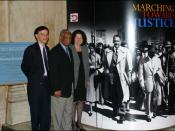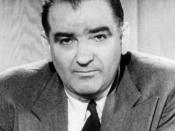Race, religion, and other differences always have and probably always will create difficulties in our society. By examining past mistakes, we can hope to discern how best to attack today's issues. In the wake of September 11, Arabs living in America face profiling and often discrimination. Blacks also still feel the effects of racist attitudes lingering from the time of slavery.
Throughout twentieth century America we have seen several civil and human rights controversies. Women have struggled for equal rights with men, especially the right to vote. Japanese Americans during World War II were rounded up and forced to live in concentration camps. There was the "Red Scare" and the persecution of communists in the 1950s. Finally, Blacks in the South fought a long battle for equal rights, especially in education.
Women's Suffrage: Until 1919, women in the United States were not allowed to vote. The struggle for equal rights, however, was not a new one.
The Seneca Falls Convention of July 1848 was the start of a long campaign for women's suffrage. Susan B. Anthony registered to vote in her hometown of Rochester, NY, in 1872. When she cast her ballot, she was arrested. At her trial, she addressed the judge, "In your ordered verdict of guilty, you have trampled underfoot every vital principle of our government. My natural rights, my civil rights, my political rights, are all alike ignored" (1). Leading a new movement to win the vote, she co-founded the Women's Suffrage Association with Elizabeth Cady Stanton. Women picketed at the White House, went on hunger strikes, and sent delegates. A sign one woman held on a street corner read: "Kaiser Wilson, Have you forgotten your sympathy for the poor Germans because they were not self governed? 20,000,000 America women are not self governed" (2). Finally, the...


